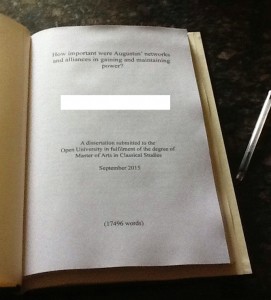In December 2015 our first holder of the Baron Thyssen MA Scholarship in Classical Studies completed her studies, achieving a Merit in our MA in Classical Studies. To celebrate this achievement we asked Sam to share her experiences of being an MA student at the OU. Here’s what she wrote …
I started with the OU in 2006, a level 1 Spanish module for pleasure, which quickly developed into a BA (Hons) Humanities with Classical Studies. I had always regretted not taking Latin and Roman history further than ‘O’ level at school, so this was the fulfilment of a personal ambition. Three months after finishing my degree, I realised that I missed the studying (the OU is addictive!), and looked into an MA in Classics. There was a taught MA at the University in my home city, but I felt that the OU continued to meet my personal needs better: I am a single mum, who works school hours, and I needed the flexibility that studying with the OU gave me. The fact that it was mainly assignment-based was an important part of my choice, as I don’t do as well in exams. And I knew that I would have the same tutor from my Classics degree modules for the first two years of the MA (who then became my dissertation supervisor), and that continuity was a bonus.
The first year was busy, four different blocks, giving a good grounding for what was to come, and although the TMAs were challenging, I could see my progress through the year as I became more analytical, critical, and more concise in my writing, and was beginning to get an idea for what I really enjoyed and would like to do for my dissertation. I even passed the exam at the end of the year, which gave me confidence for the second year, which I was not looking forward to: Greek Theatre. I didn’t think I would enjoy this, but threw myself into it in my normal way, and discovered that it really wasn’t too bad. I think that having done the Myth module as part of my degree helped with the background, and a few of us from across the country met in Cambridge just before the module started to watch the Greek plays that year, which brought them alive, and showed us that Aristophanes was still relevant (and very funny) today.
And finally, my favourite part: the dissertation. I am quite motivated and focussed in my studies, and really enjoyed all of the reading and researching. I knew that historiography was the area that interested me the most, and wanted to investigate Marcus Agrippa and his contribution to Augustus’ rise to power. Having discussed this with my tutor, this was expanded to ‘How important were Augustus’ networks and alliances in gaining and maintaining power?’. It was a really vibrant time in Rome’s history: there is still a lot of extant literature and even more modern scholarship. My research led me through some well-known names: Julius Caesar, Marcus Antonius, Cicero, but also the development of the army, and of patronage, the changing political situation, and relationships with client kings. But most of all, to find evidence of the many skilled men who worked in the background and supported Augustus.
How did I develop? Key to it all were my time management skills, and being flexible in my studies (as my children moved from primary to secondary school, it became increasingly difficult to put them to bed at 8 pm so that I could study, so l adapted to shorter sessions at night and early morning, and whenever the opportunity arose!). I developed the ability to speed read and quickly pick out what I needed from a text. Now I am definitely more critical when reading modern scholarship and finally better at argument and balance, thanks to my supervisor who constantly challenged me. I also benefitted from SCONUL access to Manchester University Library, and the OU’s own online resources and the JSTOR database. I have a small library of my own now too.
I hope that I have shown my children that it is never too late to achieve something you really want, and that you can do well if you work hard at it. Achieving the MA was good, but more than that, I met some wonderful people along the way who kept me going (we were lucky enough to have face-to-face tutorials then, but still used forums to keep in touch). I now enjoy Greek theatre, which seems to be enjoying a revival, and I discovered a love of Homer. I’m not sure of my next steps – after a few months off, I am definitely missing the studying, and want to brush up my Latin, while I keep my eyes open for opportunities where I can use my administrative skills combined with something in the Classical world. I would really recommend the OU MA: as University teaching becomes more digital and online, they have a wealth of experience in providing distance-learning modules, and excellent tutors to support you.
by Sam Spencer


Thanks Sam, just signed up for MA Classical Studies although I have found out that the tutorials are all online which is a bit of a blow as I have never, yes, never missed a tutorial or day school yet.
Hmmm trepidation and excitement in one.